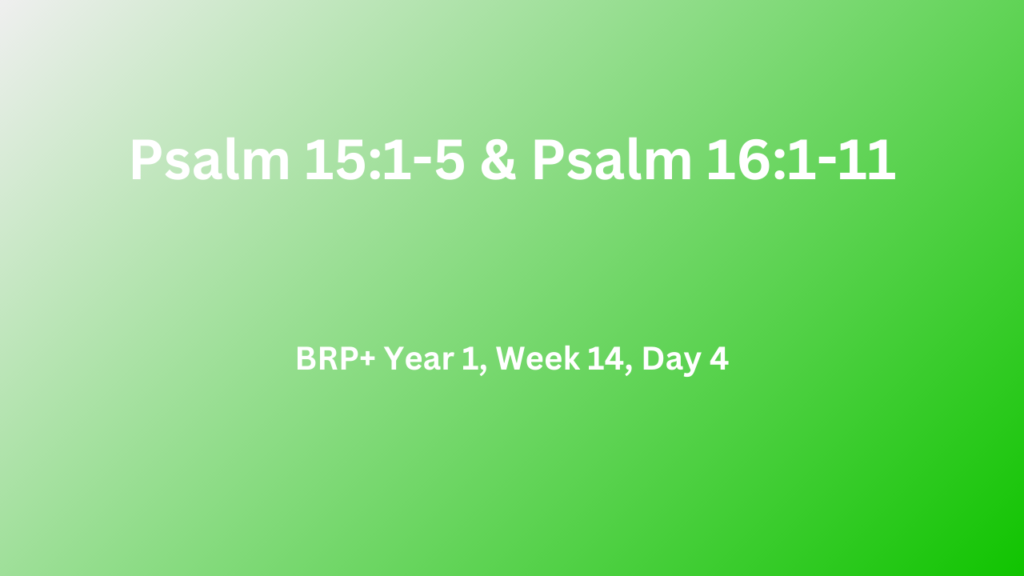Psalm 15:1-5 & Psalm 16:1-11
Psalm 15:1-5: Q.1. What did David mean by ‘dwelling in the tabernacle on the holy hill’? Whose approach is acceptable to God? What attitudes and actions should be avoided? Is it worth paying such a price? – (Ps.15:1-5)
The Ark of the Covenant was the symbol of God’s presence amongst His people. David never built a temple for the ark, but he did take the Ark to its lodging place at Mount Zion in Jerusalem. After his first failed attempt to take the Ark to Jerusalem, David eventually succeeded. With great fanfare and joy, he placed it in the tent that he had pitched for it. (see 2 Sam.6:12-29 c.f. 2 Sam.6:1-11). It was the place designated by God for worship – But you shall seek the Lord at the place which the Lord your God will choose from all your tribes, to establish His name there for His dwelling, and there you shall come … then it shall come about that the place in which the Lord your God will choose for His name to dwell, there you shall bring all that I command you: your burnt offerings and your sacrifices, your tithes and the contribution of your hand, and all your choice special offerings which you will vow to the Lord (Dt.12:5 & 11 c.f. Ps.132:13-14). This enabled sinful people to have fellowship with their holy God. However, just going to this place was no more beneficial than ‘going to church’. David recognized the necessity of entering God’s presence with honesty and humility – He who walks with integrity, and works righteousness, and speaks truth in his heart (Ps.15:2). In this Psalm, he described the right attitudes and actions, and also the wrong ones that we can have in our approach to God (see Ps.15:3-5). He concluded … He who DOES these things will never be shaken (Ps.15:5). Having dealings with God requires meeting with Him in truth – and to walk in the light as He Himself is in the light (1 Jn.1:7). To do any less is futile.
Psalm 16:1-11: Q.2. With what frame of mind did David call on God? What was David’s attitude toward the godly and the ungodly? How had God rewarded him? – (Ps.16:1-6)
It is obvious that no one was more important to David than God – I said to the Lord, “You are my Lord; I have no good besides You” (Ps.16:2). He considered his present circumstances and declared – 5 The Lord is the portion of my inheritance and my cup; You support my lot. 6 The lines have fallen to me in pleasant places; Indeed, my heritage is beautiful to me (Ps.16:5-6). He placed himself under God’s protection (see Ps.16:1). He applauded the saints and identified them as – the majestic ones in whom is my delight (Ps.16:3). In contrast, he would have nothing to do with those who turned to other gods (see Ps.16:4). God had prospered him and opened up a wide door of opportunity (see Ps.16:5-6). This testimony of God’s blessing has often been claimed by Christian missions over the centuries.
Q.3. What difference does it make to live for God? What was David’s confidence in life and death? In what way is this understood to be a prophecy of Christ’s resurrection? – (Ps.16:7-11 c.f. Acts 2:24-32; 13:34-37)
David had steadfastly pursued a policy of pleasing God, by following His principles – I have set the Lord continually before me; Because He is at my right hand, I will not be shaken (Ps.16:8). This brought him constant peace and joy and convinced him that he had nothing to fear (see Ps.16:9). Living like this also gave him wisdom and direction, even during times while meditating on his bed – I will bless the Lord who has counselled me; Indeed, my mind instructs me in the night (Ps.16:7). This confidence did not just help him in life. He also was able to face death with similar peace – 10 For You will not abandon my soul to Sheol; Nor will You allow Your Holy One to undergo decay. 11 You will make known to me the path of life; In Your presence is fullness of joy; In Your right hand there are pleasures forever (Ps.16:10-11). David had absolute assurance that death did not end it all, but that there was a resurrection issuing in pleasures forevermore (see Ps.16:11). The apostles Peter on the Day of Pentecost and Paul on his first missionary journey were in no doubt that this prophecy was looking beyond David, to the resurrection of Christ – 34 As for the fact that He raised Him up from the dead, no longer to return to decay, He has spoken in this way: `I will give you the holy and sure blessings of David.’ 35 Therefore He also says in another Psalm, `You will not allow Your Holy One to undergo decay.’ 36 For David, after he had served the purpose of God in his own generation, fell asleep, and was laid among his fathers and underwent decay; 37 but He whom God raised did not undergo decay (Ps.16:1-11 c.f. Acts 13:34-37; Acts 2:24-32).

